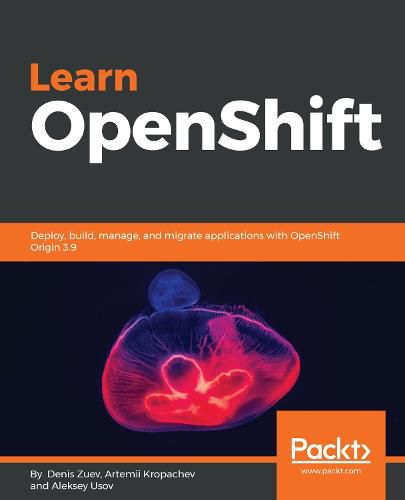Readings Newsletter
Become a Readings Member to make your shopping experience even easier.
Sign in or sign up for free!
You’re not far away from qualifying for FREE standard shipping within Australia
You’ve qualified for FREE standard shipping within Australia
The cart is loading…






This title is printed to order. This book may have been self-published. If so, we cannot guarantee the quality of the content. In the main most books will have gone through the editing process however some may not. We therefore suggest that you be aware of this before ordering this book. If in doubt check either the author or publisher’s details as we are unable to accept any returns unless they are faulty. Please contact us if you have any questions.
Gain hands-on experience of installing OpenShift Origin 3.9 in a production configuration and managing applications using the platform you built
Key Features
Gain hands-on experience of working with Kubernetes and Docker Learn how to deploy and manage applications in OpenShift Get a practical approach to managing applications on a cloud-based platform Explore multi-site and HA architectures of OpenShift for production
Book DescriptionDocker containers transform application delivery technologies to make them faster and more reproducible, and to reduce the amount of time wasted on configuration. Managing Docker containers in the multi-node or multi-datacenter environment is a big challenge, which is why container management platforms are required. OpenShift is a new generation of container management platforms built on top of both Docker and Kubernetes. It brings additional functionality to the table, something that is lacking in Kubernetes. This new functionality significantly helps software development teams to bring software development processes to a whole new level.
In this book, we’ll start by explaining the container architecture, Docker, and CRI-O overviews. Then, we’ll look at container orchestration and Kubernetes. We’ll cover OpenShift installation, and its basic and advanced components. Moving on, we’ll deep dive into concepts such as deploying application OpenShift. You’ll learn how to set up an end-to-end delivery pipeline while working with applications in OpenShift as a developer or DevOps. Finally, you’ll discover how to properly design OpenShift in production environments.
This book gives you hands-on experience of designing, building, and operating OpenShift Origin 3.9, as well as building new applications or migrating existing applications to OpenShift.
What you will learn
Understand the core concepts behind containers and container orchestration tools Understand Docker, Kubernetes, and OpenShift, and their relation to CRI-O Install and work with Kubernetes and OpenShift Understand how to work with persistent storage in OpenShift Understand basic and advanced components of OpenShift, including security and networking Manage deployment strategies and application’s migration in OpenShift Understand and design OpenShift high availability
Who this book is forThe book is for system administrators, DevOps engineers, solutions architects, or any stakeholder who wants to understand the concept and business value of OpenShift.
$9.00 standard shipping within Australia
FREE standard shipping within Australia for orders over $100.00
Express & International shipping calculated at checkout
This title is printed to order. This book may have been self-published. If so, we cannot guarantee the quality of the content. In the main most books will have gone through the editing process however some may not. We therefore suggest that you be aware of this before ordering this book. If in doubt check either the author or publisher’s details as we are unable to accept any returns unless they are faulty. Please contact us if you have any questions.
Gain hands-on experience of installing OpenShift Origin 3.9 in a production configuration and managing applications using the platform you built
Key Features
Gain hands-on experience of working with Kubernetes and Docker Learn how to deploy and manage applications in OpenShift Get a practical approach to managing applications on a cloud-based platform Explore multi-site and HA architectures of OpenShift for production
Book DescriptionDocker containers transform application delivery technologies to make them faster and more reproducible, and to reduce the amount of time wasted on configuration. Managing Docker containers in the multi-node or multi-datacenter environment is a big challenge, which is why container management platforms are required. OpenShift is a new generation of container management platforms built on top of both Docker and Kubernetes. It brings additional functionality to the table, something that is lacking in Kubernetes. This new functionality significantly helps software development teams to bring software development processes to a whole new level.
In this book, we’ll start by explaining the container architecture, Docker, and CRI-O overviews. Then, we’ll look at container orchestration and Kubernetes. We’ll cover OpenShift installation, and its basic and advanced components. Moving on, we’ll deep dive into concepts such as deploying application OpenShift. You’ll learn how to set up an end-to-end delivery pipeline while working with applications in OpenShift as a developer or DevOps. Finally, you’ll discover how to properly design OpenShift in production environments.
This book gives you hands-on experience of designing, building, and operating OpenShift Origin 3.9, as well as building new applications or migrating existing applications to OpenShift.
What you will learn
Understand the core concepts behind containers and container orchestration tools Understand Docker, Kubernetes, and OpenShift, and their relation to CRI-O Install and work with Kubernetes and OpenShift Understand how to work with persistent storage in OpenShift Understand basic and advanced components of OpenShift, including security and networking Manage deployment strategies and application’s migration in OpenShift Understand and design OpenShift high availability
Who this book is forThe book is for system administrators, DevOps engineers, solutions architects, or any stakeholder who wants to understand the concept and business value of OpenShift.